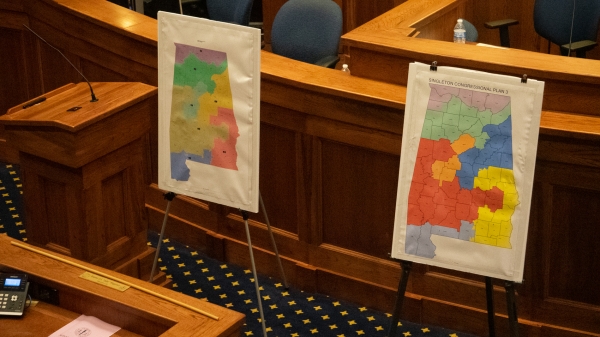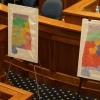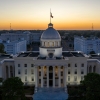By Brandon Moseley
Alabama Political Reporter
On Wednesday, March 25, the Alabama political landscape was rocked by the US Supreme Court. It is difficult to foresee the long term effects emanating out of Wednesday’s ruling; but one possible outcome is that the District Court could ultimately toss out the State’s 2010 redistricting plan and order special elections. If this were to happen it would mean that legislators would face voters….and not necessarily the voters in their districts as they are currently drawn, much sooner than anybody thought possible just yesterday.
Governor Robert Bentley (R) has been lobbying reluctant legislators to support his $541 million tax increase plan. That was a hard sell when the legislature did not have to run for re-election until 2018. Now that the future of the State is in the courts it is possible that the legislators will be answering to voters again in just months.
The Alabama Political Reporter spoke with former State Senator Scott Beason (R-Gardendale) about this possibility. Sen. Beason is now the senior policy adviser for the Alabama Free Market Alliance.
Former Sen. Beason said that he hoped that legislators vote against the Governor’s tax plan because it is the right thing to do; but there is a possibility that some Republican legislators who would have voted for the plan will change their position now that they could be facing a Republican Primary soon.
Sen. Beason said that if the District Judge or the US Supreme Court orders special elections without a President or a Governor’s race at the top of the ticket that turnout would likely be low. Beason said only the most dedicated voters who see voting as their patriotic duty will show up to vote in a contested Republican Primary and they care about repealing Common Core, low taxes, and limited government.
If the State House and Senate districts are redrawn, many districts that aren’t competitive now could suddenly be in play if the other party can find a credible challenger. Beason acknowledged to the Alabama Political Reporter that if a district changed substantially a candidate who had just voted to raise the voters’ taxes could well be vulnerable.
Sen. Beason said that the court ordered a special election in the 1980’s so there is a precedent for this.
State Senator Jim McClendon (R-Springville) told the Alabama Political Reporter that he thought that the chances for a special election were “slim,” but acknowledged that that was a possibility.
Others were skeptical that the lower court could find in favor of the State after the ruling by the nation’s highest court.
State Representative Christopher John England (D-Tuscaloosa) wrote on Facebook, “The Supreme Court has remanded the Alabama Black Caucus case back to the District Court for rehearing. The case will have to be re-litigated using specific instructions on how the law in question will have to be interpreted and subsequently applied to the facts in this case.”
Rep. England continued, “After reading the Supreme Court opinion, in my opinion, it is going to be extremely difficult for the lower court to rule in favor of the State of Alabama after the case is reheard. For example, the Supreme Court strongly suggested that there are Senate Districts in Alabama that were unconstitutionally racially gerrymandered.”
The Tuscaloosa legislator and attorney wrote, “Here is a quote from the opinion to illustrate what I mean. “For example, once the legislature’s “equal population” objectives are put to the side – i.e. seen as a background principle – then there is a strong, perhaps overwhelming evidence that race did predominate as a factor when the legislature drew the boundaries of Senate District 26, the one district that the parties have discussed here in depth”.”
Rep. England concluded, “Therefore, at some point before the 2018 election, I sincerely believe that someone (maybe the Legislature or a Judge) will be tasked with redrawing the maps which will then require new elections.”
One legal analyst told the Alabama Political Reporter that it is possible that this entire 2015 legislative session could be invalidated by the court if they find that Alabama violated the 1965 Voting Rights Act during redistricting. If that “worst case scenario” were to happen the new legislature would have to go back and revisit everything that this legislative session did anyway.
Governor Bentley has proposed eight separate tax increases.
State Representative Mike Hill (R-Columbiana) is sponsoring the Governor’s Corporate Income Tax bill. House Bill 142 would generate $20 million for the State by requiring combined income reporting for corporations that do business in other states.
State Representative John Knight (D-Montgomery) is sponsoring the Governor’s Insurance Premium Tax bill. House Bill 277 would generate an estimated $25 million by removing credits for state privilege tax paid by insurance companies, ad valorem tax, and for office facilities and real property investments.
Representative Steve Clouse (R-Ozark) is sponsoring House Bill 268 which generate an estimated $200 million in revenue for the general fund by increasing the rate for automobile sales to 4 percent.
Rep. Lynn Greer (R-Rogersville) is sponsoring the Governor’s Financial Institution Excise Tax, which would generate just $1 million in new revenue by removing the credit that financial institutions receive for sales taxes paid.
State Representative Ken Johnson (R-Hillsboro) sponsored the Governor’s Individual Income Tax bill. House Bill 240 would generate $12 million for the State by eliminating income tax withholding exemption certificates.
Rep. Steve Clouse is also sponsoring the Governor’s hike in the Rental Tax on Automobiles. House Bill 267 would generate an estimated $31 million for the state of Alabama by increasing the rate for car and truck rentals to 4 percent.
Rep. Steve McMillian (R-Bay Minette) is sponsoring the Governor’s Cigarette and Tobacco Tax. House Bill 139 would generate an estimated $205 million by increasing the tax per pack of cigarettes from $.825 to $1.25 and would increases the tax on other tobacco products like chewing tobacco proportionately.
Rep. Christopher England (D-Tuscaloosa) is sponsoring the Governor’s Public Utilities License Tax. House Bill 276 raises $47 million by removing the exemption that applies to municipal utilities.
A public hearing on many of the Governor’s revenue measures has been scheduled for Wednesday, April 1.
Do any of these tax increases move forward while legislators are confronted by fears that they will have to gear up for unexpected campaigns?
The Legislature asked for and received pre-clearance of the redistricting plan from the U.S. Department of Justice Civil Rights Division as was then required by law. The State is sure to make that argument when this goes back before the court.























































